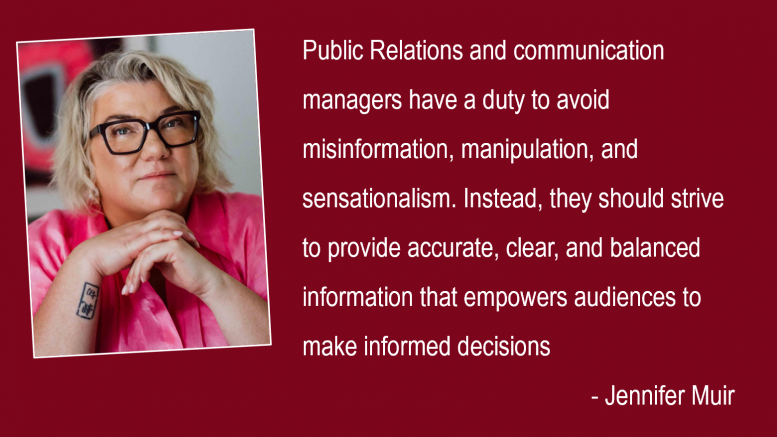In a world increasingly defined by digital connectivity and global challenges, the role of public relations (PR) and communication managers has become crucial in shaping public discourse, influencing behaviour, and fostering societal change. These professionals are not just messengers; they are key actors and influencers with the power to drive progress toward a more sustainable, equitable, and just world. By aligning their strategies with the United Nations Sustainable Development Goals (SDGs), adhering to ethical communication practices, and supporting the United Nations’ commitment to information integrity, PR and communication managers can wield their influence for the common good.
Aligning Communication Strategies with the SDGs
The United Nations Sustainable Development Goals represent a universal call to action to address the world’s most pressing issues, including poverty, inequality, climate change, and peacebuilding. For PR and communication managers, the SDGs offer a framework to guide their messaging and campaigns in ways that promote positive social outcomes and contribute to global progress.
For example, a PR campaign focused on promoting gender equality (SDG 5) can challenge harmful stereotypes and highlight the achievements of women in various fields. By elevating stories that reflect diversity and inclusion, communicators can influence public attitudes, inspire action, and support the broader goal of gender equality. Similarly, campaigns that promote responsible consumption and production (SDG 12) can encourage sustainable practices among consumers and businesses, fostering a culture of environmental stewardship.
Ethical Communication: The Foundation of Responsible Influence
Ethical communication is the cornerstone of responsible influence. As highlighted by the Global Alliance for Public Relations and Communication Management, responsible communication involves honesty, transparency, respect, and accountability. It is about ensuring that the messages conveyed are not only effective but also morally sound and socially responsible.
PR and communication managers have a duty to avoid misinformation, manipulation, and sensationalism. Instead, they should strive to provide accurate, clear, and balanced information that empowers audiences to make informed decisions. This is particularly important in public health communications (SDG 3: Good Health and Well-being), where the dissemination of reliable, evidence-based information can significantly impact public attitudes and behaviours. By practicing ethical communication, professionals can build trust, foster dialogue, and contribute to a more informed and engaged public.
Upholding Information Integrity
The integrity of information is critical in maintaining public trust and fostering informed decision-making. The United Nations’ Global Principles for Information Integrity emphasise the need for accurate, reliable, and trustworthy information, particularly in an age where misinformation can easily spread. PR and communication managers must commit to upholding these principles by ensuring that their communications are grounded in factual information, transparent sourcing, and clear distinctions between opinion and fact.
This commitment to information integrity is vital during crises or public debates, where misinformation can lead to harmful consequences. By prioritising truthfulness and clarity, communicators can help mitigate the spread of false information and contribute to a more informed and resilient public. Upholding information integrity also aligns with the broader goals of the SDGs, particularly those related to peace, justice, and strong institutions (SDG 16).
The Call for an 18th SDG: Responsible Communication
In a significant development, the Global Alliance for Public Relations and Communication Management has called for the establishment of an 18th Sustainable Development Goal focused on responsible communication. This proposed goal would underscore the importance of ethical and transparent communication in achieving sustainable development and addressing global challenges. By advocating for responsible communication as a core component of the SDGs, PR and communication managers can further elevate the role of their profession in driving positive social change.
Supporting the call for an 18th SDG aligns with the United Nations’ commitment to information integrity and reflects the growing recognition of communication as a critical tool for sustainable development. As the world faces increasingly complex challenges, the role of PR and communication managers as stewards of the common good will only grow in importance. Purposeful influence, grounded in ethics and integrity, is not only about achieving short-term objectives but also about contributing to long-term societal progress.
Conclusion: Influence with Purpose and Integrity
Public relations and communication managers are uniquely positioned to influence public attitudes and behaviours in ways that advance the common good. By aligning their work with the United Nations Sustainable Development Goals, practicing ethical communication, and upholding information integrity, these professionals can drive meaningful change that benefits both businesses and communities.
The path forward requires a commitment to purpose-driven communication that goes beyond short-term gains to focus on long-term societal impact. As key actors and influencers, PR and communication managers have the power to shape a future that is sustainable, inclusive, and just for all. By embracing their role as ethical communicators and supporting the call for an 18th SDG on responsible communication, they can help create a world where purposeful influence is a force for the common good.
The World Public Relations Forum in Bali 19-22 November 2024 will explore Purposeful Influence for the Common Good. Join global professionals, experts and leaders and register now.
The views and opinions published here belong to the author and do not necessarily reflect the views and opinions of the publisher.



Be the first to comment on "Purposeful Influence for the Common Good: The Role of Public Relations and Communication Managers"